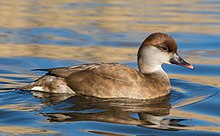Thered-crested pochard(Netta rufina) is a largediving duck.The scientific name is derived fromGreekNetta"duck", andLatinrufina,"golden-red" (fromrufus,"ruddy" ).[2]Its breeding habitat is lowlandmarshesand lakes in southern Europe and it extends from the steppe and semi-desert areas on the Black Sea to Central Asia and Mongolia, wintering in theIndian Subcontinentand Africa. It is somewhatmigratory,and northern birds winter further south into north Africa.
| Red-crested pochard | |
|---|---|

| |
| Male | |

| |
| Female | |
| Scientific classification | |
| Domain: | Eukaryota |
| Kingdom: | Animalia |
| Phylum: | Chordata |
| Class: | Aves |
| Order: | Anseriformes |
| Family: | Anatidae |
| Genus: | Netta |
| Species: | N. rufina
|
| Binomial name | |
| Netta rufina (Pallas,1773)
| |

| |
| Range ofN. rufina Breeding Resident Non-breeding
| |

The adult male is unmistakable. It has a rounded orange head, red bill and black breast. The flanks are white, the back brown, and the tail black. The female is mainly a pale brown, with a darker back and crown and a whitish face. Eclipse males are like females but with red bills. They are gregarious birds, forming large flocks in winter, often mixed with other diving ducks, such ascommon pochards.They feed mainly by diving or dabbling. They eataquatic plants,and typically upend for food more than most diving ducks.
A wheezingvehtcall can be given by the male. Series of hoarsevrah-vrah-vrahcalls can also be heard from females.
Red-crested pochards build nests by the lakeside among vegetation and lay 8–12 pale green eggs. The birds' status in theBritish Islesis much confused because there have been many escapes and deliberate releases over the years, as well as natural visitors from the continent. However, it is most likely that they are escapees that are now breeding wild and have built up a successfulferalpopulation. They are most numerous around areas ofEnglandincludingGloucestershire,Oxfordshire,Northamptonshireand also spotted in Leicestershire.
The red-crested pochard is one of the species to which theAgreement on the Conservation of African-Eurasian Migratory Waterbirds(AEWA) applies.
References
edit- ^BirdLife International (2016)."Netta rufina".IUCN Red List of Threatened Species.2016:e.T22680348A86012189.doi:10.2305/IUCN.UK.2016-3.RLTS.T22680348A86012189.en.Retrieved13 November2021.
- ^Jobling, James A (2010).The Helm Dictionary of Scientific Bird Names.London: Christopher Helm. pp.269,342.ISBN978-1-4081-2501-4.
External links
edit- RSPB Birds by Name
- BirdLife species factsheet forNetta rufina
- "Netta rufina".Avibase.
- "Red-crested pochard media".Internet Bird Collection.
- Red-crested pochard photo galleryat VIREO (Drexel University)
- Interactive range map ofNetta rufinaatIUCN Red List
- Audio recordings of Red-crested pochardonXeno-canto.
